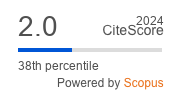Depressive Symptoms Among Sarajevo University Students: Prevalence and Socio-Demographic Correlations
DOI:
https://doi.org/10.5644/ama2006-124.227Keywords:
Depressive Symptoms, Beck Scale, BDI Score, University StudentsAbstract
Objectives. The aim of this research was to detect the presence of depressive symptoms among the student population at a Faculty of Medicine, as well to determine the correlation between the socio-demographic characteristics and students’ lifestyle and depressive symptoms.
Subjects and Methods. Of 800 students enrolled and asked to participate, 412 responded to the survey. The study included Students from all 6 years of studies. The degree of depressive symptoms was measured by a 21-item revised form of the Beck Depression Inventory (BDI). We built bivariate logistic regression models to study whether age, gender, housing accommodation, year of medical training, and school success status (Grade Point Average - GPA) were associated with depressive symptoms. The results are reported as odds ratios (OR) with 95% confidence intervals (CI).
Results. The study revealed that almost one third of students reported BDI >16 (30.1%). The present study did not find any association between BDI scores and study year or age difference, but we found that there was an association between housing accommodation and depressive symptoms. Students who lived with their parents had lower BDI scores than those who lived in a dormitory. The results of this study showed there is a negative correlation between physical activity and depressive symptoms in students, as well as that there is a positive correlation between depressive symptoms and substance abuse.
Conclusion. Overall, our study confirms that the factors associated with an increase in medical students’ depressive symptoms are housing accommodation, a lack of physical activity and substance abuse. Regarding failing a year of study at the medical school, as well as gender and age differences, we did not find any significant difference between students with higher compared to those with lower depressive symptoms.





